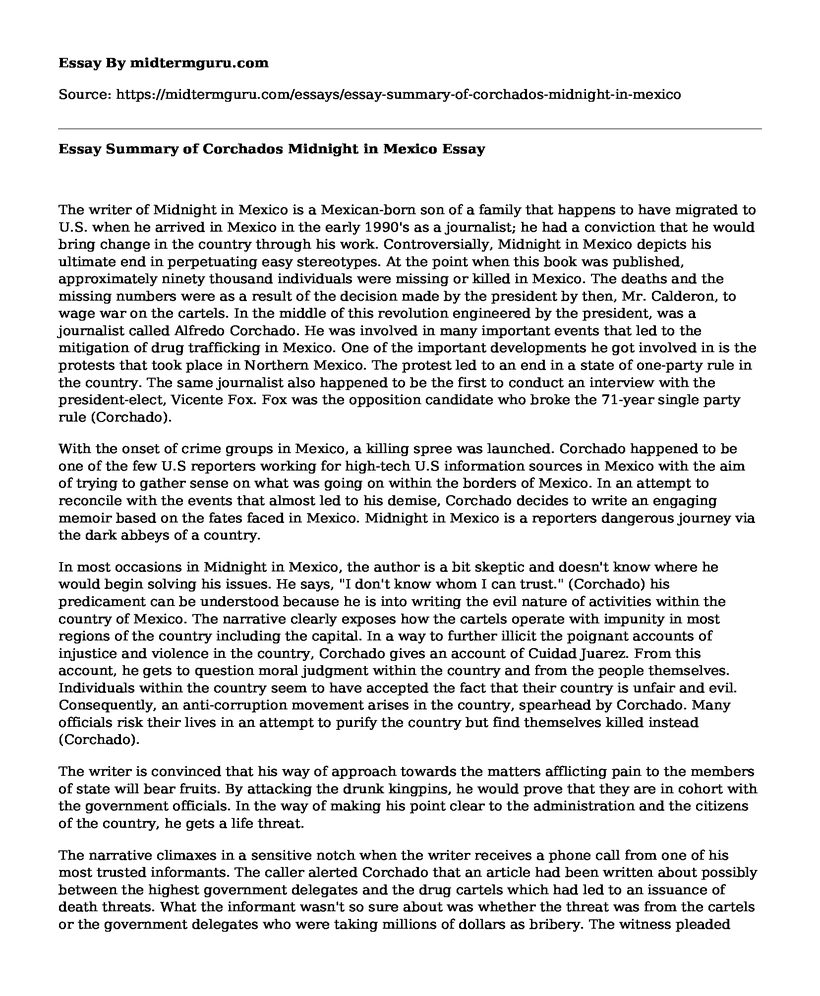The writer of Midnight in Mexico is a Mexican-born son of a family that happens to have migrated to U.S. when he arrived in Mexico in the early 1990's as a journalist; he had a conviction that he would bring change in the country through his work. Controversially, Midnight in Mexico depicts his ultimate end in perpetuating easy stereotypes. At the point when this book was published, approximately ninety thousand individuals were missing or killed in Mexico. The deaths and the missing numbers were as a result of the decision made by the president by then, Mr. Calderon, to wage war on the cartels. In the middle of this revolution engineered by the president, was a journalist called Alfredo Corchado. He was involved in many important events that led to the mitigation of drug trafficking in Mexico. One of the important developments he got involved in is the protests that took place in Northern Mexico. The protest led to an end in a state of one-party rule in the country. The same journalist also happened to be the first to conduct an interview with the president-elect, Vicente Fox. Fox was the opposition candidate who broke the 71-year single party rule (Corchado).
With the onset of crime groups in Mexico, a killing spree was launched. Corchado happened to be one of the few U.S reporters working for high-tech U.S information sources in Mexico with the aim of trying to gather sense on what was going on within the borders of Mexico. In an attempt to reconcile with the events that almost led to his demise, Corchado decides to write an engaging memoir based on the fates faced in Mexico. Midnight in Mexico is a reporters dangerous journey via the dark abbeys of a country.
In most occasions in Midnight in Mexico, the author is a bit skeptic and doesn't know where he would begin solving his issues. He says, "I don't know whom I can trust." (Corchado) his predicament can be understood because he is into writing the evil nature of activities within the country of Mexico. The narrative clearly exposes how the cartels operate with impunity in most regions of the country including the capital. In a way to further illicit the poignant accounts of injustice and violence in the country, Corchado gives an account of Cuidad Juarez. From this account, he gets to question moral judgment within the country and from the people themselves. Individuals within the country seem to have accepted the fact that their country is unfair and evil. Consequently, an anti-corruption movement arises in the country, spearhead by Corchado. Many officials risk their lives in an attempt to purify the country but find themselves killed instead (Corchado).
The writer is convinced that his way of approach towards the matters afflicting pain to the members of state will bear fruits. By attacking the drunk kingpins, he would prove that they are in cohort with the government officials. In the way of making his point clear to the administration and the citizens of the country, he gets a life threat.
The narrative climaxes in a sensitive notch when the writer receives a phone call from one of his most trusted informants. The caller alerted Corchado that an article had been written about possibly between the highest government delegates and the drug cartels which had led to an issuance of death threats. What the informant wasn't so sure about was whether the threat was from the cartels or the government delegates who were taking millions of dollars as bribery. The witness pleaded with the writer to flee for his life immediately.
Funny enough, instead of running to the borders like he always did when faced with such harsh threats, Corchado decided to remain within the streets of the capital to investigate the falsehood or truth in his informants allegations. The author takes eighty pages trying to outsource the credibility of his informant's claim. He was never intimidated by the tales of other journalists who had worked the same path and gone without trail. The only way that he found to be credible enough to enable him get the information he requires is to cause drama. At all costs, Corchado realizes that at all costs, the threat is not severe enough to cancel a dinner party. Fortunate enough, the author survives the turmoil. His story thrives to live in a dramatic and sociological context. The narrative happens to possess the ability to enlighten anyone who gets the chance to read it from the most novices to the expert.
Midnight in Mexico elicits understanding for the modern Mexico. The drug economy of the country happens to be organized within the international division of labor. Nevertheless, this is not an interest to the writer, but instead, he is interested in the stability of social welfare in Mexico consumed by drug wars. Corchado recognizes the coverage of other journalists in an attempt to sensitize the middle-class individuals to rise against the morally deceased society of Mexico to bring change (Corchado).
Reference
Corchado, Alfredo. (2013). Journalist Alfredo Corchado says it's "Midnight in Mexico." latimes, 14 June 2013. Www.Articles.Latimes.Com/2013/jun/14/entertainment/la-ca-jc-alfredo-corchado-midnight-in-mexico-20130616. 15 Feb. 2017.
Cite this page
Essay Summary of Corchados Midnight in Mexico. (2021, Jun 03). Retrieved from https://midtermguru.com/essays/essay-summary-of-corchados-midnight-in-mexico
If you are the original author of this essay and no longer wish to have it published on the midtermguru.com website, please click below to request its removal:
- Essay Sample on Gender Dynamics in Fight Club
- Paper Example on Art and Architecture: Analysis of Buildings in New York
- Movie Analysis Essay on Pearl Harbor
- Temple of Zeus: Ancient Masterpiece of Doric Architecture - Essay Sample
- Diving Into Anxiety Disorder: A Summary of 'As Good as It Gets' - Movie Analysis Essay
- Antonio Torres: An Extraordinary 2D Artist Who is Contributing to Industry Growth - Research Paper
- Character Analysis of Jack in Lord of the Flies







